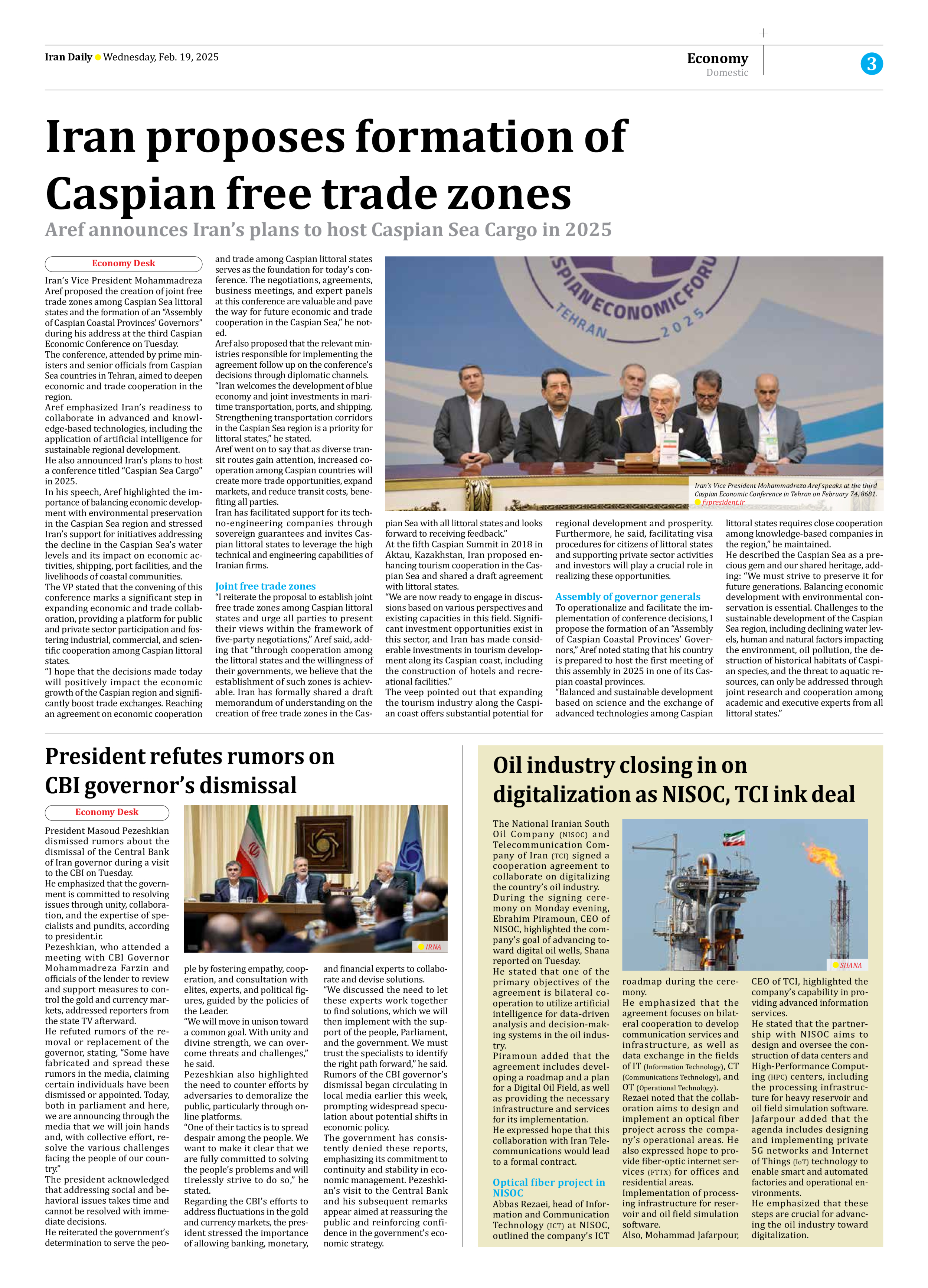
Iran proposes formation of Caspian free trade zones
Aref announces Iran’s plans to host Caspian Sea Cargo in 2025
Iran’s Vice President Mohammadreza Aref proposed the creation of joint free trade zones among Caspian Sea littoral states and the formation of an “Assembly of Caspian Coastal Provinces’ Governors” during his address at the third Caspian Economic Conference on Tuesday.
The conference, attended by prime ministers and senior officials from Caspian Sea countries in Tehran, aimed to deepen economic and trade cooperation in the region.
Aref emphasized Iran’s readiness to collaborate in advanced and knowledge-based technologies, including the application of artificial intelligence for sustainable regional development.
He also announced Iran’s plans to host a conference titled “Caspian Sea Cargo” in 2025.
In his speech, Aref highlighted the importance of balancing economic development with environmental preservation in the Caspian Sea region and stressed Iran’s support for initiatives addressing the decline in the Caspian Sea’s water levels and its impact on economic activities, shipping, port facilities, and the livelihoods of coastal communities.
The VP stated that the convening of this conference marks a significant step in expanding economic and trade collaboration, providing a platform for public and private sector participation and fostering industrial, commercial, and scientific cooperation among Caspian littoral states.
“I hope that the decisions made today will positively impact the economic growth of the Caspian region and significantly boost trade exchanges. Reaching an agreement on economic cooperation and trade among Caspian littoral states serves as the foundation for today’s conference. The negotiations, agreements, business meetings, and expert panels at this conference are valuable and pave the way for future economic and trade cooperation in the Caspian Sea,” he noted.
Aref also proposed that the relevant ministries responsible for implementing the agreement follow up on the conference’s decisions through diplomatic channels.
“Iran welcomes the development of blue economy and joint investments in maritime transportation, ports, and shipping. Strengthening transportation corridors in the Caspian Sea region is a priority for littoral states,” he stated.
Aref went on to say that as diverse transit routes gain attention, increased cooperation among Caspian countries will create more trade opportunities, expand markets, and reduce transit costs, benefiting all parties.
Iran has facilitated support for its techno-engineering companies through sovereign guarantees and invites Caspian littoral states to leverage the high technical and engineering capabilities of Iranian firms.
Joint free trade zones
“I reiterate the proposal to establish joint free trade zones among Caspian littoral states and urge all parties to present their views within the framework of five-party negotiations,” Aref said, adding that “through cooperation among the littoral states and the willingness of their governments, we believe that the establishment of such zones is achievable. Iran has formally shared a draft memorandum of understanding on the creation of free trade zones in the Caspian Sea with all littoral states and looks forward to receiving feedback.”
At the fifth Caspian Summit in 2018 in Aktau, Kazakhstan, Iran proposed enhancing tourism cooperation in the Caspian Sea and shared a draft agreement with littoral states.
“We are now ready to engage in discussions based on various perspectives and existing capacities in this field. Significant investment opportunities exist in this sector, and Iran has made considerable investments in tourism development along its Caspian coast, including the construction of hotels and recreational facilities.”
The veep pointed out that expanding the tourism industry along the Caspian coast offers substantial potential for regional development and prosperity. Furthermore, he said, facilitating visa procedures for citizens of littoral states and supporting private sector activities and investors will play a crucial role in realizing these opportunities.
Assembly of governor generals
To operationalize and facilitate the implementation of conference decisions, I propose the formation of an “Assembly of Caspian Coastal Provinces’ Governors,” Aref noted stating that his country is prepared to host the first meeting of this assembly in 2025 in one of its Caspian coastal provinces.
“Balanced and sustainable development based on science and the exchange of advanced technologies among Caspian littoral states requires close cooperation among knowledge-based companies in the region,” he maintained.
He described the Caspian Sea as a precious gem and our shared heritage, adding: “We must strive to preserve it for future generations. Balancing economic development with environmental conservation is essential. Challenges to the sustainable development of the Caspian Sea region, including declining water levels, human and natural factors impacting the environment, oil pollution, the destruction of historical habitats of Caspian species, and the threat to aquatic resources, can only be addressed through joint research and cooperation among academic and executive experts from all littoral states.”







